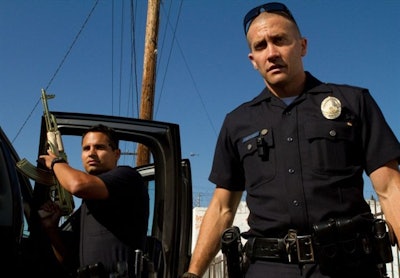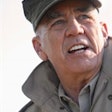 Photo courtesy of Open Road Films.
Photo courtesy of Open Road Films.
Open Road's "End of Watch" was based on the experiences of Captain Jamie FitzSimons, a former LAPD patrol officer who worked South Los Angeles neighborhoods in the 1990s. This is the primary reason the movie rings true with an authentic approach to police work.
FitzSimons now oversees the patrol operations of the Summit County (Colo.) Sheriff's Office, but before that he patrolled the 77th, Southwest, Rampart, and Wilshire divisions. He also worked as a narcotics investigator in the Newton Division south of downtown where the "End of Watch" story takes place.
The movie follows Officers Brian Taylor (Jake Gyllenhaal) and Mike Zavala (Michael Peña), two gutsy, honest coppers searching "Shootin' Newton" for "dope, money, and guns—all the major food groups."
A vehicle stop leads to the seizure of drugs and "Liberace's AK." A welfare check at a home leads to the discovery of a storeroom of drugs and bodies. The Sinaloa Cartel then orders a "green light" on the officers.
The movie, somewhat surprisingly, was written and directed by David Ayer, who wrote the screenplay for "Training Day" (2001). Ayer also wrote screenplays for "Dark Blue" (2002) and "S.W.A.T." (2003) He also directed "Street Kings" (2008).
"End of Watch" is a far cry from "Training Day," arguably the most iconoclastic police corruption movie ever made.
In an interview with PoliceMag.com, Ayer said the movies offer widely divergent perspectives about police work and gang enforcement.
Ayer and FitzSimons met shortly after "Training Day" and became fast friends. FitzSimons, the technical advisor on "End of Watch" and "Street Kings," said Ayer is a friend of law enforcement and the new movie proves it.
"I don't think 'Training Day' was a slant on cops, it was a story from the street's perspective," said FitzSimons. "He's telling this story from the cops' perspective, and he's telling the story about how all this violence affects these guys in their personal lives."
After Ayer finished the script, the two men went through it line by line to make sure there were no mistakes about the details of police work.
"That's the difference between a good cop movie and a bad one," he said. "Cops are the worst critics. It just takes one little thing. It was really important that we got it right."
The movie may just be the first to prominently feature on-body police video cameras. Ayer based the cameras on the Scorpion digital video cameras worn by actual LAPD officers, and used footage from the devices in the movie.
FitzSimons also worked closely with Gyllenhaal and Peña so they would seem like real cops. He taught the actors how to hold their guns, how to wear a uniform, and even how to have "that cop swagger."
In the five months of pre-production, the actors went on numerous ride-alongs with three Southern California agencies. As a result, the movie tells its story in way that should delight members of the Thin Blue Line.
"It's definitely pro law enforcement," FitzSimons said. "Not only is it for cops, it's for the community at large to show them who we really are. We're not just a guy in a uniform."
Related:















